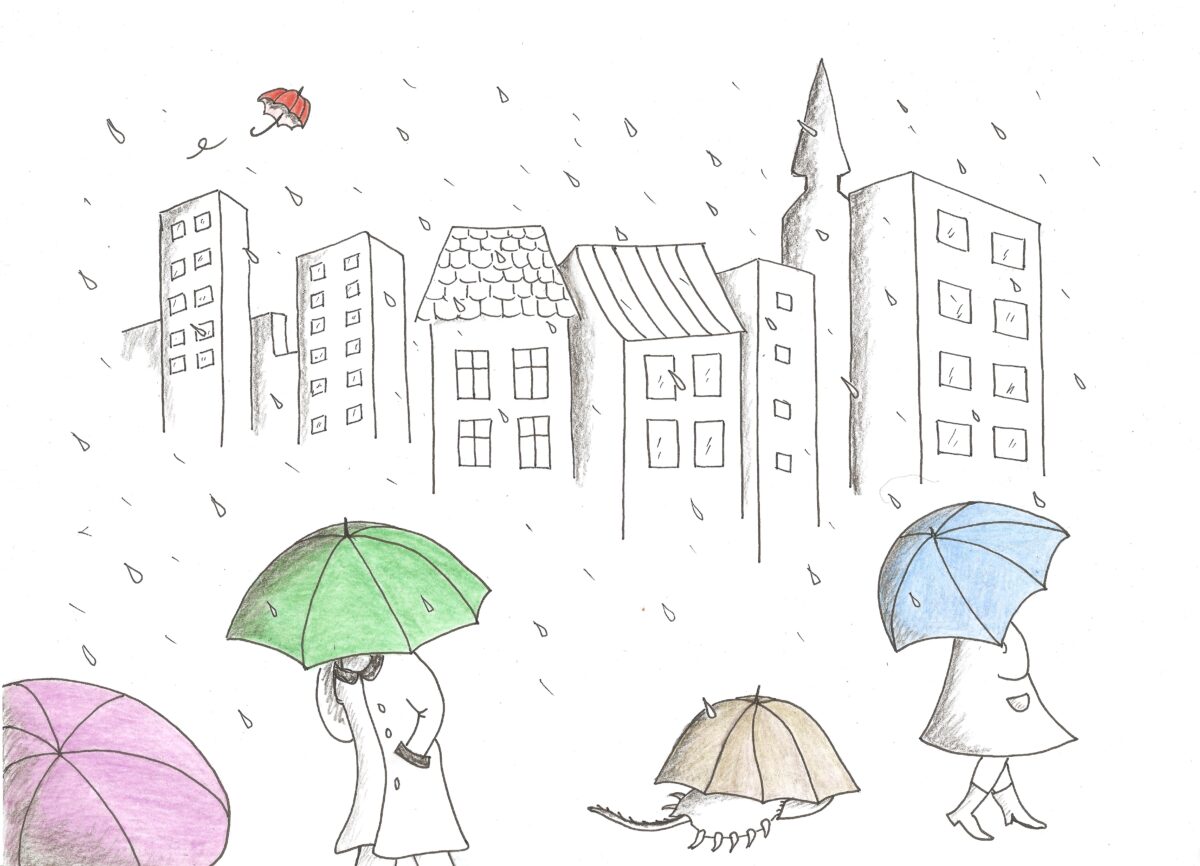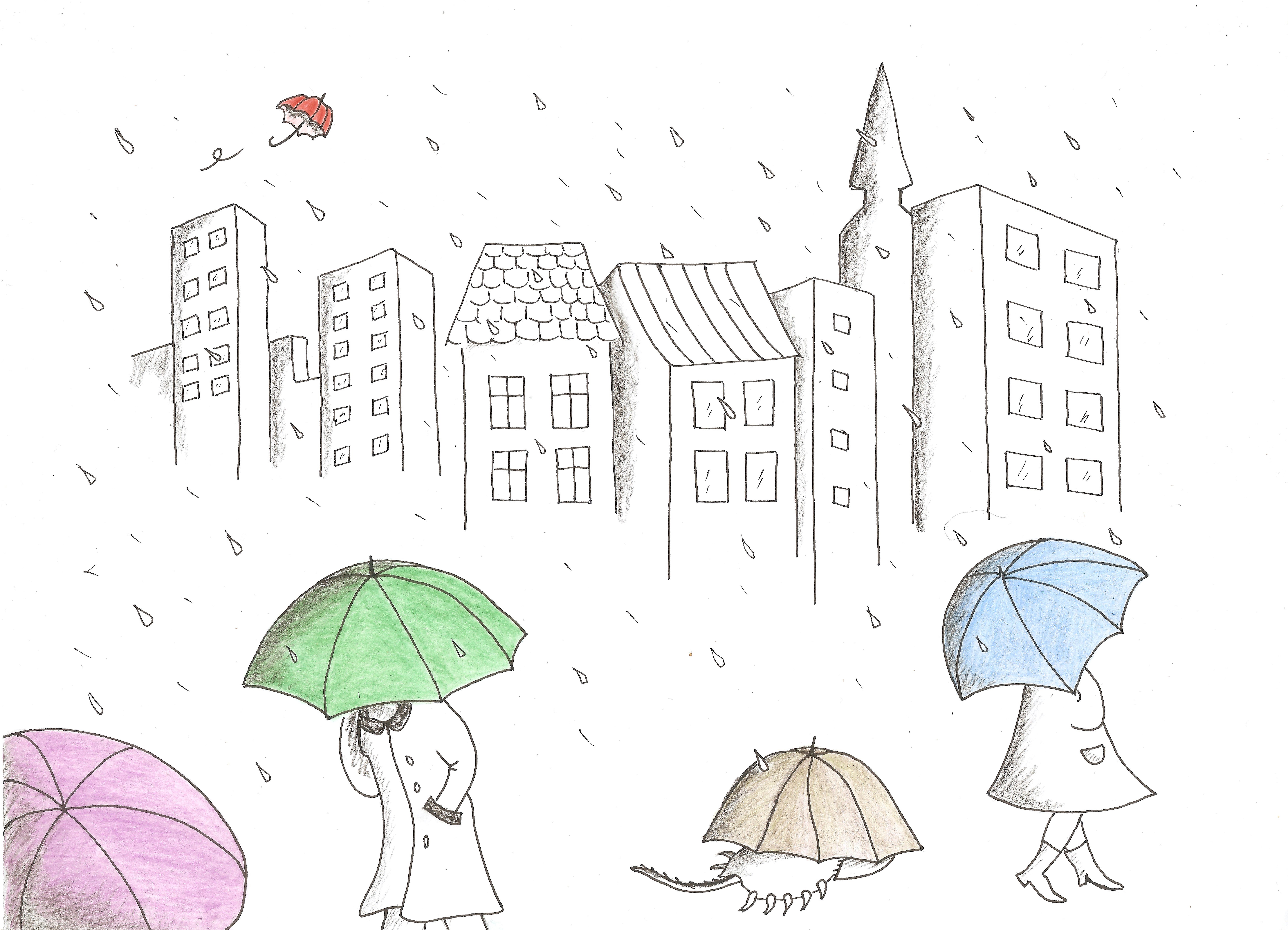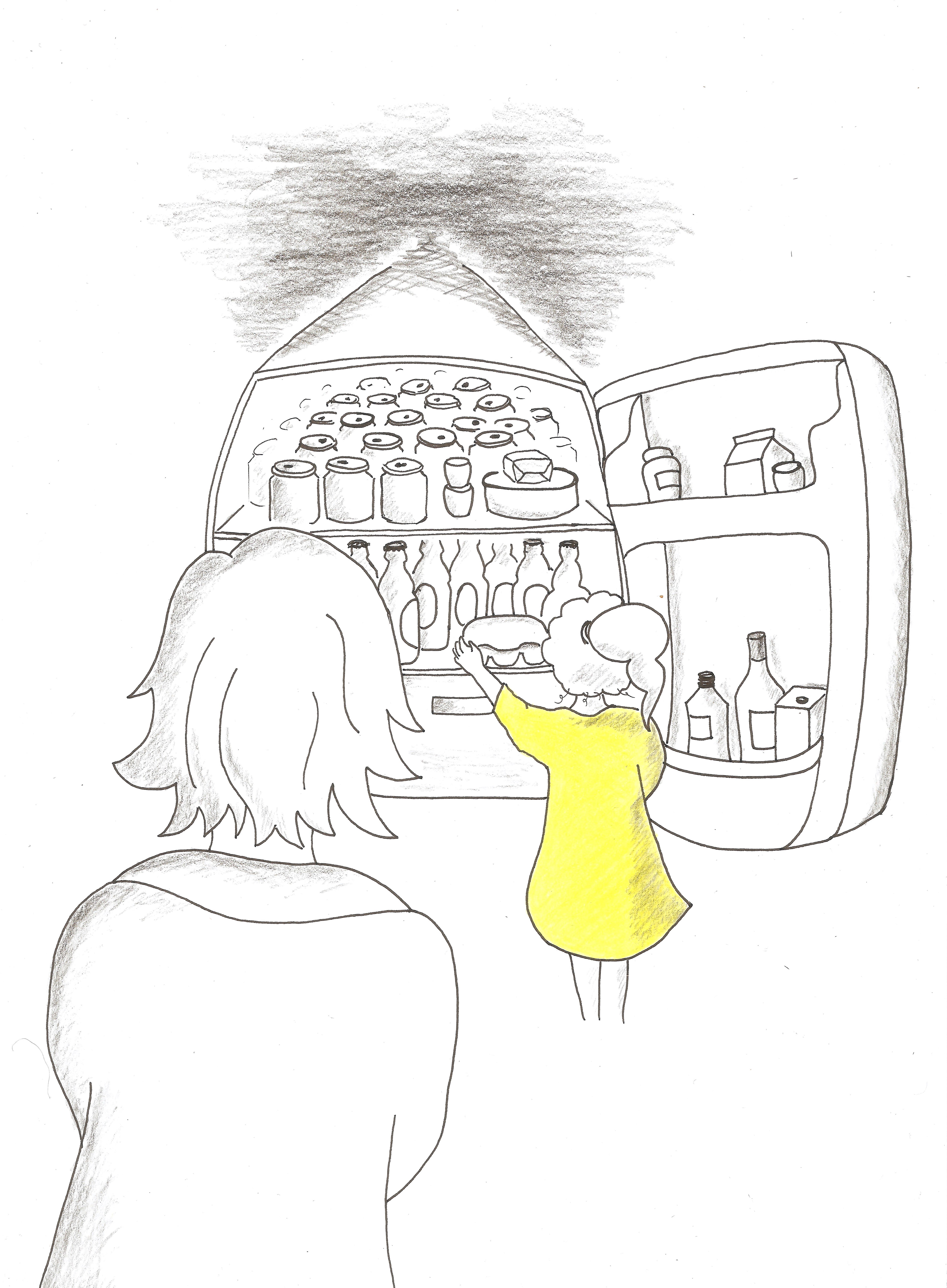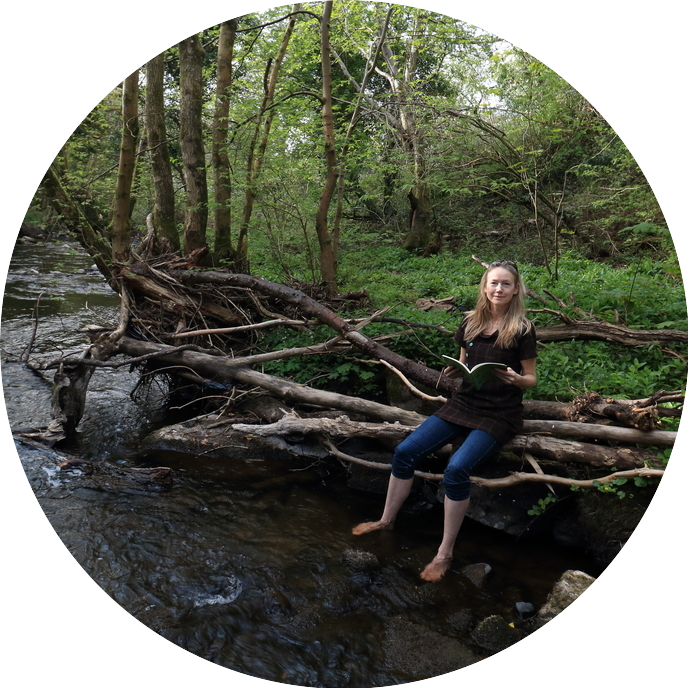By Gazelle Buchholtz
You can listen to the audio story version narrated by Gazelle in this podcast episode of 1000 Better Stories.
“Theodore, it doesn’t work. The eggs keep drifting away,” Doreen says as she stands by the wide living room window and looks out at the pouring rain in the garden. The water has created miniature streams that run across the borders between the neighbouring gardens.
“Perhaps a fox ran away with them,” he suggests, absent minded as his attention is bound to his work documents scattered on the dining table, and conveniently distracting him from the infinite downpour.
“A fox wouldn’t be that smart, it would only go for real eggs,” Doreen concludes monotonously. She says in the same tone, “We ought to do something about the waters. Perhaps installing something to retain it,” she says with the gaze fixed on the outside world.
When he looks up from the table, his eyes meet the back of her head.
“We could, but I doubt it would be at any help as long as the rain constantly buckets down. There seems to be no end to it,” he concludes and his attention returns to the papers on the table.
“But what else can we do?” Her hesitant question hangs in the air. She gathers herself and sums up the daily statement which is identical to the previous day’s, “The News affirms the rain is here to stay. There’s no weather clearance in sight.”
She pauses before capitulating, “I’d better call Mirren. The kids will be devastated when they hear that the Easter hunt is cancelled.”
Doreen sighs and reaches out for her phone, worrying how her grandchildren will receive the news about the tradition’s termination.
…
Isla sits by the window, her favourite place in the flat on the third floor. Her mum has told that they will get a visitor and has instructed Isla to wake her up when that happens. The visitor’s name is Doreen.
Isla’s world takes off from the window. Her mum has not complained about the chair Isla has pulled in front of the window some time ago. The chair has kept its position as a stairway. When she climbs up onto it and sits on her heels, her elbows can lean on the window sill while her head rests in her palms. Umbrellas in blue, green, purple and red, light up as they move along the city’s grey paths. Underneath, the round shells are directed by people but sometimes it’s almost as if animals or aliens control the umbrellas. A slow, dark brown umbrella makes her think to the tv programme with a horseshoe crab moving across the sandy seabed. There might be a horseshoe crab under the umbrella. Perhaps it has eaten so much that there is no more food left in the sea, and it has grown up to a human size and had to go ashore to find food. Luckily with the rain the horseshoe-crab-human will not feel too alienated on the pavement.
The doorbell interrupts the wandering. Before heading to the door, Isla checks on her mum. She sleeps heavily as usual and doesn’t react to the bell. Isla opens the door.
A woman smiles. She says her name is Doreen and Isla steps aside. The woman asks if her mum is home before she enters. Her mum is sleeping and it is difficult to wake her up, she replies. Isla wants to add that her mum is most likely in a bad mood when awakened, but does not. She would rather chat with the visitor.
“Where’s your umbrella,” Isla asks.
“I got here in my car so I don’t need an umbrella,” Doreen replies.
“Oh,” Isla says in a low voice and searches her mind for something else she can ask about.
“Don’t you need it for hunting?”
“Hunting?”
“Yes, when you go into the supermarket. Everyone’s got one. They all shake it when they go in.”
“I see. Sure, I do have an umbrella, but today it’s my husband going hunting in the supermarket,” Doreen says with a large smile on her face. Isla detects it as a friendly signal, the woman is not laughing at her. To her relieve, the woman takes up the chat.
“What about you, do you go hunting after Easter eggs?” asks Doreen still smiling.
Isla looks into Doreen’s eyes and enjoys the soft tone of her voice. She would like to stay in the shower of light and kindness.
“Perhaps you will have an Easter hunt in the flat?” Doreen suggests in response to Isla’s silence, and with an attempt to get her on track.
Isla looks puzzled by the question and cast her eye over the apartment. Sofa, tv, table and chairs, none of these familiar pieces connect to eggs. All at once, she walks quickly out of the hallway. Doreen takes it as an invitation to follow. They end in the kitchen, in front of the fridge.
“It’s my job to keep the drinks cold, so I know where everything is,” Isla declares seriously as she opens the refrigerator door.
Bottles clink as her hand wiggles around in the fridge, aiming for the treasure chest. Carefully she pulls out the egg tray and opens it.
“There is one left,” Isla exclaims triumphantly while gently picking up the egg with her thumb and index finger. With a stretched arm she presents the catch to the visitor.
They both look intensely at the white chicken egg.
“Well done you,” says Doreen.
Isla finds the game odd but the pleasantness of hanging out with the grown-up makes her feel comfortable.
“Is it an eater egg?” Isla wants to know.
For a moment the woman looks puzzled before she understands and answers the question.
“Oh yes, this is indeed a very good species of an easter egg,” Doreen confirms and suggests to Isla to put the egg back in the treasure chest, to keep it chilled until Isla’s mum will cook it. Doreen also suggests they go hunting for other food items in the flat. As weird as it is, Isla guides Doreen and she likes the gentle and focused visit, and that they are on a shared operation. When they reach the cupboard, where Isla presents the bag with raisins and packets of biscuits, she jumps back to the egg hunt.
“Imagine finding eggs in the wild. We can’t chase raisins or biscuits but we could find birds and eggs in the nature. They might be in the park,” Isla exclaims eagerly.
“What’s that nonsense about going into the wild? You got to go to school and do your chores,” mumbles her mum. She has emerged from her sofa, and the door frame of the kitchen supports her abrupt vertical position. The two others look at the sudden appearance.
“I told you to wake me up when we got company,” Isla’s mum adds sulkily.
…
…
Months after, Doreen keeps thinking about that egg. Shortly after, the eggs disappeared. As she walks through the supermarket, she notices that they eventually have reorganised the section usually occupied with eggs. They have given up waiting for eggs, in the section usually stacked with trays of them the empty space is replaced with soft drinks on discounts.
She wonders if that last egg at Isla’s place was ever eaten, or if it drowned in beer cans and wine bottles which have first priority. Under normal circumstances, there would be an endless egg supply in the supermarket. Any supermarket would have shelves packed with eggs. Cage eggs, free range and organic eggs. Chicken eggs. For decades the song thrush, skylark, lapwing and house sparrow have declined, but why worry about that? Their eggs don’t have shelf space in the supermarket. Only because Theodore was a keen bird watcher, Doreen could dust off some memories of a few modest articles, squeezed into almost hidden column inches in a newspaper. But she remembers how it had upset her husband. However, only chickens and their eggs made it to the headlines, thinks Doreen as she is standing in line, waiting to pay for her groceries.
“Wish we could go back to normal,” states Doreen to herself with a sigh and unfolds her umbrella as she leaves the supermarket.
…
“It’s like a reverse evolution,” says her daughter excitedly.
Since Mirren was a kid, she clearly inherited her dad’s interest in birds. Doreen often felt she was left on an island of emptiness when the two of them went out on field trips, or even worse when they shared experiences between them when she was in the room. Bitterness creeps in when thinking of the ocean of hours spent trying to relieve teenager aggressions in an attempt to reach her daughter, and then her husband took off with the most smiley, joyful version of their daughter – to watch birds. Doreen never felt she cracked the code, but the tensions eased out as Mirren grew up and got her own children. That is what Doreen assured herself.
“It makes sense if you think of it. You have these creatures, descenders of dinosaurs, stuffed into storage with nothing to do besides laying eggs. It’s like if we don’t use our muscles, they will degrade, atrophy,” she says, throwing out her arms.
“It sounds plausible what has been put up as a theory. With no place to take a dust bath, no need for insulation and to keep warm, they have no need for feathers. They go back to where they came from, the reptiles with scales instead of feathers,” says Mirren’s dad in admiration.
“But the shift must make a clash in the care of eggs and the newly hatched chicks. Feathering birds are keen on taking care of their offspring, fewer reptiles are on that task. It could leave the eggs vulnerable,” follow up his daughter.
“There must be some birds, or new reptiles, or whatever they are, escaping into the wild and making it,” adds Doreen to the family think tank.
They both look at her baffled.
“It can’t be the case,” Theodore states surely and continue with his teacher voice, “Look at the news, it’s all about mass bird death these days. It’s years ago we heard that the majority of egg-laying hens got broken keel bones, broken from within. Nothing was done at the time, and it kept going downhill. The artificial breeding pressure causes the destruction of the very same egg production system, and the birds, are bred to lay too many and too large eggs. Escaping birds would have been found, or they wouldn’t make it as free beings. There isn’t much wild nature left. Farmland and city life isn’t exactly optimal living place. For the new reptiles, the changes are happening too fast. Whether they are old or new egg-laying creatures, they must all have collapsed.”
Doreen sees the picture. It sounds horrible and depressing, but also, feels like she is in a lecture room where she has to come up with a solution to pass an exam. Father and daughter continue their discussion, and Doreen hears words in the periphery as agriculture, insects, fertilisers and pesticides while her attention is pushed away and she stares at the rain on the other side of the window.
A nagging feeling is poking her. Her mind drifts back to that day with the last egg. The egg wrapped in the girl’s excitement. There was not much Doreen could do for Isla. Countless children live on the outskirt of their parents’ attention, parents side-tracked on alcohol or drugs with just enough food and elements to tick off a home, passing the requirements of official standards.
But what was it the girl said? She wanted to go egg hunting in the wild. Doreen lights up at the idea.
Part II coming next month…
Storytellers Collective
Gazelle wishes to strengthen people’s connection to the natural world with her thought-provoking stories.
She’s an associate in The Surefoot Effect, a community interest company, which aims to equip people, communities and organisations with skills for sustainability and resilience.
In her home country Denmark, she graduated with a Master of Science in communication of scientific knowledge, and a Minor in creative writing. She’s based in Scotland, and after the publication of her first fictional book ‘Sleepless tracks’ (in Danish), she works on finding ways to get stories out in English.
gazelle.buchholtz@gmail.com




